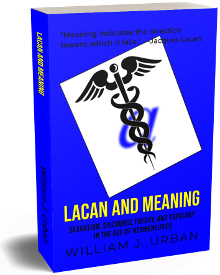LACAN AND MEANING
SEXUATION, DISCOURSE THEORY, AND TOPOLOGY IN THE AGE OF HERMENEUTICS
CHAPTER 2
WITHDRAWALS FROM MEANING
— page 34 —
consciousness as intentional. As the word implies, consciousness is directed beyond itself to a vast array of objects both real and ideal. There are, then, acts of consciousness and objects of those acts; consciousness is always consciousness of something. But Husserl does not so much think of the object as external to consciousness. Rather, it is the content of the act of consciousness, the correlative matter referring consciousness to an object in such a way that it fixes the object meant precisely in the way in which it is meant. The object meant in a meaning-intentional act is thus the matter of that act and an ideal object of meaning. So in no way are meanings to be hypostasized ‘up there.’ At most, Husserl’s theory suggests a moderate Platonic approach where meaning is envisaged as a half-existing stuff in the heavens. In Kantian terms, meaning is designated a simple phenomenal entity, a Gegenstand, an object which belongs to the domain of possible experience. A subjective meaning-intentional act would then be required to transform that possibility into a fully existent actuality. Said otherwise, the universality of meaning is instantiated into an objectivated instant through the conscious act of a subject intending a particular meaning.
Against the new phenomenological science, classical hermeneutics appears quite tame. It had primarily focused on interpretive consciousness for its grasp of meaning. But Husserl opens up countless other acts of consciousness for investigation, and does so for their constitutive grasp of meaning. Of course, Heidegger’s later acceptance of meaning as irreducibly non-univocal creates a need for phenomenology to hermeneutically choose from among competing potentialities of meaning. But Husserl’s earlier insistence on the univocality of meaning suggests another path. If meanings cannot be built out of other meanings, phenomenology can effectively do without the hermeneutical explication of composite formations. For meaning comes already objectively known to the conscious subject. The only thing left is to describe the processes constituting that meaning. This is amply demonstrated by his student Ingarden.
Developed over three-quarters of a century ago, Ingarden’s work is the first and still the best application of strict Husserlian phenomenology to aesthetics in general and to the reading of literary texts in particular. Accordingly, his investigations into the phenomenon of reading are not descriptions of what transpires in the mind when meaning is understood during the reading experience. They are attempts to discern and methodically interpret the meaning constituted in that experience. The examination of this object of experience, and not just the experience itself, is a defining feature of phenomenology. It is also what defends against psychologism. Ingarden laments that despite Frege’s and Husserl’s fatal critiques, interpreters remain all too susceptible to psychologism’s erroneous belief that experiencing subjects form verbal meanings in isolation. If this were the case, how one correctly understands a word used by another remains a mystery. But not so when meanings are held as identical and transcendent to all experiences, and existing as such only through those
« prev next »full text of Lacan and Meaning
FREE Lacanian-themed puzzles

